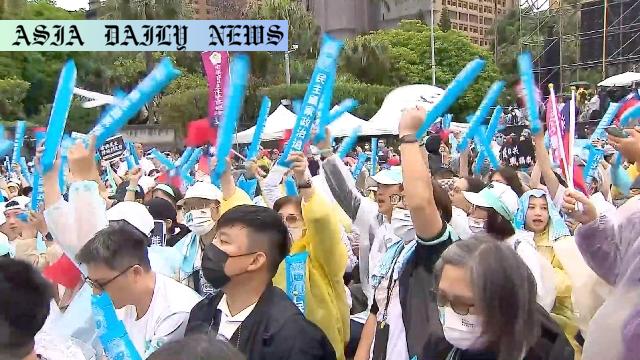Recall campaigns are heating up amidst partisan divisions, targeting lawmakers and Taiwanese President Lai.
The Kuomintang plans to recall Taiwanese President Lai Ching-te after May 20.
Recall campaigns are targeting 50 lawmakers amidst partisan divisions.
Accusations of forgery and misuse of judicial processes fuel tensions.
The Kuomintang accuses Lai of dictatorship and creating hostility in Taiwan.
An opposition rally highlights the sharp divide in Taiwanese politics.

Introduction to Taiwan’s Heated Political Climate
Taiwan is currently witnessing a heated political struggle as the opposition Kuomintang (KMT) party has announced plans to initiate the recall of President Lai Ching-te after May 20. This decision comes on the one-year anniversary of Lai taking office and amidst growing partisan divisions within the Taiwanese legislature. Recall campaigns in Taiwan have become a focal point of political contention, with accusations, allegations of forgery, and rallies highlighting the growing divide within the nation’s political landscape.
The Recall Campaigns and Their Significance
The proposed campaign has been emboldened by widespread discontent within Taiwan’s political factions. The KMT, Taiwan’s largest opposition party, has announced its plans to initiate a legislative recall process, a move they claim is justified by President Lai’s failure to unite Taiwan and ensure peace. Notably, these recall campaigns extend beyond the executive office and target 50 lawmakers from both the ruling and opposition sides. This expansive reach has further polarized Taiwan’s political environment, causing significant unrest as allegations of unfair practices and judicial misuse surface.
Controversial Allegations of Forgery
Adding fuel to the fire, prosecutors have unveiled troubling details regarding the recall petitions initiated by the KMT. Reports of forged signatures, including those of deceased individuals, have surfaced. This has raised serious questions regarding the legitimacy of the recall effort and has placed the KMT under public scrutiny. The KMT, in their response, held a large-scale rally in Taipei on Saturday, dismissing the allegations and protesting what they termed as an overreach of the judiciary influenced by President Lai’s administration.
Kuomintang’s Rally and Accusations
During the rally, KMT leader Eric Chu openly criticized Lai, accusing the president of dictatorial practices and using the judiciary to undermine his opposition. Chu also accused Lai of fostering division within Taiwan rather than unity, painting a sharp contrast to the current administration’s goals. This rally not only showcased the growing disillusionment within segments of the population but also emphasized the KMT’s determination to see through their recall plan.
Partisan Divisions in Taiwan’s Legislature
The rift between the ruling and opposition parties extends to the structure of the Taiwanese parliament. With 113 seats, the legislature holds a slim opposition majority, creating an environment rife with political tension. These divisions were further highlighted by the participation of Huang Kuo-chang, the leader of the second-largest opposition Taiwan People’s Party, in the recent rally opposing Lai’s administration. Huang’s involvement further cements the existence of deep-seated disagreements in the nation’s legislature.
Conclusion: Implications for Taiwan’s Political Landscape
The unfolding events in Taiwan highlight the challenging road ahead for the island nation’s political stability. With allegations of forgery, misuse of judicial power, and escalating partisan tensions, the recall campaigns embody the growing pains of a democracy rife with division. If the Kuomintang follows through with its proposed recall after May 20, it will not only test the resilience of Taiwan’s government but also set a precedent for addressing political conflicts in the future. Whether these developments lead to a more united Taiwan or a further fracturing of its political landscape remains to be seen.
Commentary
The Political Divide in Taiwan: A Growing Concern
Taiwan’s current political climate is a reflection of the deep and often long-standing divisions in the island’s governance. The recall campaign initiated by the Kuomintang against President Lai Ching-te has, in many ways, brought these divisions to public attention. While such campaigns are a legitimate means of democratic expression, their execution and the controversies surrounding them highlight the need for introspection on the practices and principles guiding Taiwan’s democracy.
Concerns Over the Legitimacy of the Recall Process
A troubling aspect of this campaign is the allegations of forgery and misuse of recall petitions. The reports of dead individuals’ signatures and the judicial investigation into these claims are not just administrative concerns; they question the integrity of Taiwan’s political mechanisms. For political stability and public trust to thrive, it is essential that all such processes are not only fair but also perceived as such by the wider electorate.
The Role of Leadership in Uniting a Nation
Another important dimension to consider in this political episode is the role of leadership in bridging divides. Eric Chu’s criticism of President Lai as a divisive figure raises the fundamental question of how leaders can and should function amidst deeply polarized political contexts. While opposition and criticism are pillars of democracy, they must aim toward fostering constructive dialogues rather than exacerbating existing hostilities.
Looking Ahead: Lessons and Reflections
Taiwan stands at a crossroads. The events surrounding this recall campaign offer an opportunity for reflection and reform, not just within the KMT or the ruling party but across the entire political spectrum. Navigating these turbulent waters successfully will require a commitment to democratic principles, transparency in governance, and above all, a sincere effort to unite the people in pursuit of common goals.


